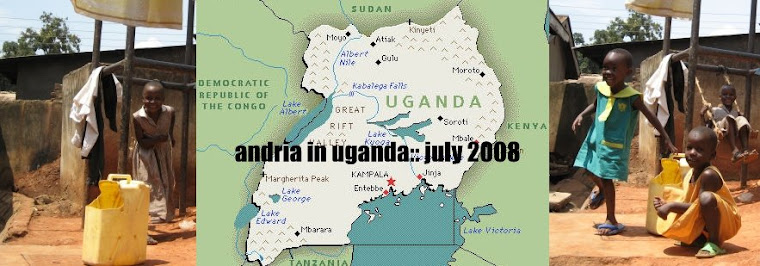Our time here is pretty much a whirlwind - we take a quick tour of the computer training centre that Anthony's group has set up in Tororo, have a quick meet up with some of Tororo's elders, (all pastor friends of Anthony's), and head to a local playing field where apparently tons of kids are eagerly awaiting our arrival.
When our bus pulls up at the playing field, we learn just how much hype has spread about our arrival. As we step off the bus, children of all ages swarm us, squealing excitedly as camera flashes go off. Everything about this is so unsettling and surreal. We feel like movie stars. Around us, everything is pandemonium - the teachers and pastors responsible for the kids try to get them under control, and eventually everyone is quiet enough for some introductions.

Things turn to chaos again, though, when it's time to hand out books and school supplies - it's almost a mob scene, pretty much. One child gets trampled, and has to be rescued - we have zero control, and it feels awful. The children who've been waiting patiently and who are doing as they've been told, end up being left without, when our supplies run out. Anthony assures us that every child will get something, that he will send extras from Kampala over, but to these kids, that's probably hard to believe, hard to understand even. Teachers and pastors step in again for crowd control duty.

The children have practiced some songs to welcome us - it's amazing how many songs they have here about welcoming guests to their country. Ian says a few words about what we've been doing in Kampala, how we are helping orphans, who we are and where we come from.
(Video above comes thru with crappy quality - apologies - any Blogger/You Tube nerds please email me if you know how to fix!)
In a bit of an awkward silence, Nick asks if the children have any questions for us. There is only one question. A beautiful girl, about thirteen, wearing a ripped school uniform steps out of the crowd to address us all. "Where does HIV come from?" she asks. Wow. It knocks the wind out of us. We can't answer. Nick ends up telling her that this is a very good question and one we don't have an answer for. She looks us each in the eye. Many of us, at this point, are mostly focused on keeping it together. Awkward silence again, until a pastor steps in to move the programme along, and the moment is lost. But not in our minds, not ever.
A few kids want to share with us some poems they've written. The subjects are so very sad. It's apparent that AIDS has touched each of these kids in a very real way...this is just life for them.
One of the poems goes like this:
HIV we wish we knew your home
The white man is searching for you
HIV where do you come from?
The black man is searching for you
HIV where do you come from?
The yellow man is searching 4 you
HIV where do you come from?
HIV you sweep the world
HIV you sweep the north
U sweep the south
HIV you sweep the west
U sweep the east
HIV U sweep mammy, U sweep daddy
HIV where do you come from?
HIV where do you come from?
HIV we wish we knew your home
There are many times on this journey that I have been overwhelmed with emotion, but hearing this girl read out this poem, with movement and rhythm and hand gestures, in front of our group of strangers, in front of her classmates, in front of her pastors, brave and unwavering, it is something.
Heather, Michon and I play a game none of us really understands with a group of young girls. The game is basically throwing a soccer ball to someone who then catches it and throws it to someone else, who then catches it and - well, this is all we understand. So, pretty much - catch. We add a twist to the game that when you catch the ball, you have to yell out your name, so that we can learn their names and they can learn ours. And so we meet Rose. And Esther. And two Brendas. And Carol. And Grace. And two Ruths. And Mary. And a little one named Innocence.
Later we drive to see a foster home. Because Tororo is small there is no formal orphanage - Anthony is hoping to raise enough funds to set one up behind the Computer Training Centre. Since there is no orphanage, orphans are cared for by local families in individual homes.


We meet one lady, a widow with one child of her own, who is caring for four foster children. The six of them all live in a small mud hut - a single room. We get to take a look inside, and we take pictures so that we can share this humbling experience with our friends and families back home, with anyone who isn't here to see it first hand. Again we are floored by the sense of community, by the generosity of these people who have so little, opening up their tiny homes to others in need.


No comments:
Post a Comment